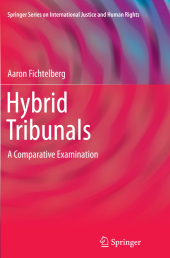 Neuerscheinungen 2016Stand: 2020-02-01 |
Schnellsuche
ISBN/Stichwort/Autor
|
Herderstraße 10
10625 Berlin
Tel.: 030 315 714 16
Fax 030 315 714 14
info@buchspektrum.de |

Aaron Fitchtelberg
Hybrid Tribunals
A Comparative Examination
Softcover reprint of the original 1st ed. 2015. 2016. xviii, 206 S. 235 mm
Verlag/Jahr: SPRINGER, BERLIN; SPRINGER NEW YORK; SPRINGER 2016
ISBN: 1-493-95337-0 (1493953370)
Neue ISBN: 978-1-493-95337-0 (9781493953370)
Preis und Lieferzeit: Bitte klicken
This unique volume combines historical and legal analyses of hybrid
tribunals, discusses the successes and shortfalls of tribunals in Sierra
Leone, Kosovo, Cambodia, East Timor and Lebanon, and offers
recommendations for future hybrid tribunals.
This book examines hybrid tribunals created in Sierra Leone, Kosovo, Cambodia, East Timor, and Lebanon, in terms of their origins (the political and social forces that led to their creation), the legal regimes that they used, their various institutional structures, and the challenges that they faced during their operations. Through this study, the author looks at both their successes and their shortcomings, and presents recommendations for the formation of future hybrid tribunals.
Hybrid tribunals are a form of the international justice where the judicial responsibility is shared between the international community and the local state where they function. These tribunals represent an important bridge between traditional international courts like the International Criminal Court (ICC), the International Criminal Tribunal for the Former Yugoslavia (ICTY), the International Criminal Tribunal for Rwanda (ICTR) and various local justice systems. Because hybrid tribunals are developed in response to large-scale atrocities, these courts are properly considered part of the international criminal justice system. This feature gives hybrid tribunals the accountability and legitimacy often lost in local justice systems; however, by including regional courtroom procedures and personnel, they are integrated into the local justice system in a way that allows a society to deal with its criminals on its own terms, at least in part.
This unique volume combines historical and legal analyses of these hybrid tribunals, placing them within a larger historical, political, and legal context. It will be of interest to researchers in Criminal Justice, International Studies, International Law, and related fields.
Introduction: Hybrid Tribunals in International Justice.- I: Forming the Hybrid Tribunals.- Sierra Leone: Civil War and Justice.- Kosovo: International and Hybrid Justice.- Cambodia: Justice (long) After the Fact.- East Timor: Genocide and Colonialism.- Lebanon: Assassination of Rafic Hariri and Global Justice.- II: Structuring the Tribunals.- Sierra Leone.- Kosovo.- Cambodia.- East Timor.- Lebanon.- III: The Tribunals in Action.- Sierra Leone: Taylor and "The Other".- Cambodia and Lebanon: Fighting for Independence.- Kosovo and East Timor: Working in the UN System.- IV: Conclusions: Evaluating the Tribunals.- Hybrid Tribunals and Local Justice.- Hybrid Tribunals and International Justice Revisited.- Guidelines for Future Tribunals.
Aaron Fichtelberg is an Associate Professor in the Department of Sociology and Criminal Justice at the University of Delaware. He has PhD from Emory University, an MA from Depaul University, and an LLM Degree from Utrecht University. Along with this book, he is the author of Law at the Vanishing Point: A Philosophical Analysis of International Law and Crime Without Borders: An Introduction to Criminal Justice. He lives in Wilmington, Delaware with his wife and two sons.


